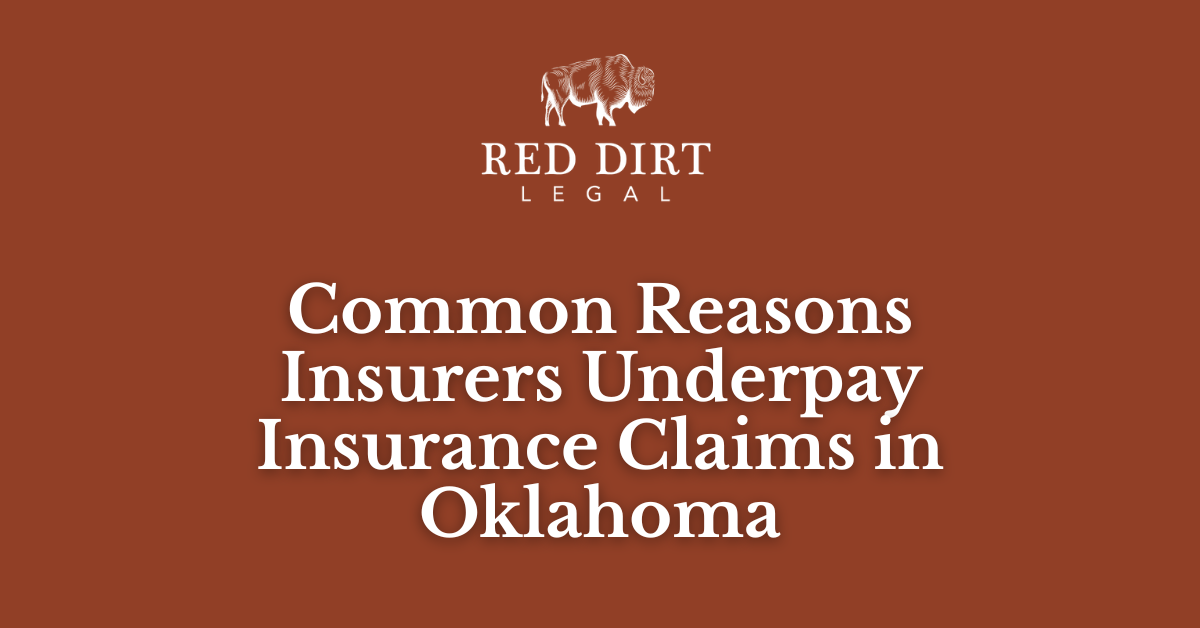When Oklahoma business owners file commercial property damage claims, they expect fair payment to cover repairs, replacement costs, and business losses. But in reality, insurance companies don’t always pay what they should. One of the most common issues policyholders face isn’t a flat-out denial, but an underpayment.
At Red Dirt Legal, we’ve worked with businesses across the state dealing with insurance headaches after storms, fires, and other costly setbacks. Understanding how underpayments happen is the first step in fighting back.
Let’s break down the most frequent reasons insurers underpay these claims and what property owners can do to protect their rights under Oklahoma law.
1. Lowball Repair Estimates
Insurers often rely on their own adjusters to estimate the cost of repairing or replacing damaged property. These estimates may leave out critical repairs, use outdated pricing, or undervalue materials and labour, especially after a major weather event when costs spike.
Businesses that accept these initial offers without question may unknowingly agree to less than what they’re owed.
2. Disputes Over Scope of Damage
Even when damage is clearly documented, insurers may dispute the full extent. For example, they might approve visible roof repairs but deny structural work below, or blame pre-existing wear and tear rather than the recent event.
These kinds of disputes are especially common in partial denial of payment situations, where only a portion of the claim is approved, leaving businesses to cover the rest out of pocket.
3. Application of Policy Exclusions
Most commercial policies include exclusions, meaning specific circumstances that aren’t covered. Insurers sometimes apply these exclusions too broadly, using vague or questionable justifications to avoid paying.
For example, damage caused by wind may be excluded if the insurer argues that poor maintenance contributed. These situations can raise bad faith concerns when exclusions are used to avoid legitimate payouts.
4. Missed or Misclassified Business Personal Property
In addition to buildings, commercial claims often include business personal property: furniture, tools, inventory, and equipment. Insurers may misclassify or undervalue these items, especially if the documentation is limited or inventory lists are outdated.
A careful review of the claim file, often done with support from a qualified attorney, can help identify where items were overlooked or undercounted.
5. Delays That Lead to Further Loss
Some insurers delay inspections or processing claims, which can increase repair costs or lead to further damage (like mold after water intrusion). When the insurer then refuses to cover the additional losses, it creates a secondary underpayment issue.
Delays may also affect business interruption coverage, which only kicks in after property damage is acknowledged. These are common issues in delayed claims and can have a cascading financial impact on the business.
6. Ambiguous Policy Language
Commercial policies are often dense, with technical terms and layered clauses that leave room for interpretation. When wording is vague, insurers tend to interpret it in their favour, reducing or limiting payouts without fully explaining their decision.
Business owners may not catch these distinctions until a claim is in progress. Having a lawyer review the terms early on can help identify coverage gaps before they lead to costly disputes.
7. Failure to Adjust for Local Market Costs
Insurance companies often use national or regional pricing databases that don’t reflect actual construction costs in Oklahoma. When labor or material costs rise locally, after a hailstorm or tornado, for example, low estimates can lead to significant underpayments.
Being proactive about submitting your own contractor estimates can help challenge these generic figures.
Don’t Assume the First Offer Is Final
An underpaid claim doesn’t mean you’re out of options. Documentation, communication, and a clear understanding of your policy can help you push back if something doesn’t feel right.
If your claim doesn’t match the actual cost of repairs or recovery, you can explore your rights under Oklahoma law. Many businesses start by gathering documentation and reviewing their policy closely to understand where the insurer may have fallen short.
And if your insurer isn’t responding fairly, contact Red Dirt Legal to learn how to take the next step toward getting what you’re owed.









